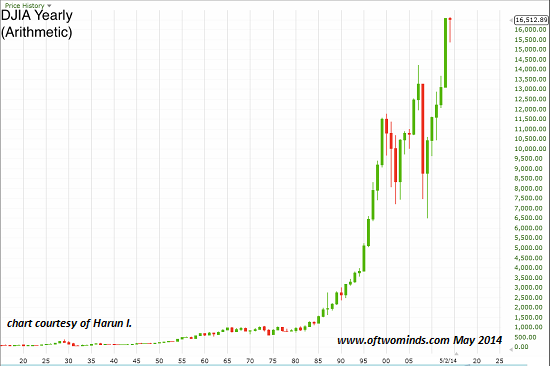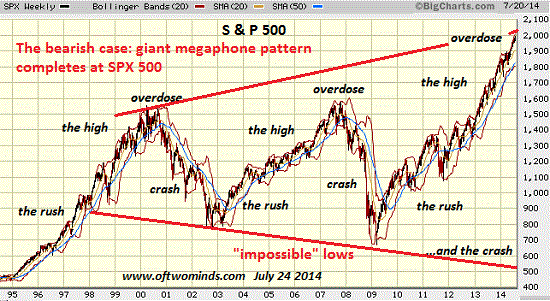Everyone who feels forced to play along plans to exit before the whole rotten structure implodes, but that's not how collapses work.
Identifying the erosion of authenticity is intrinsically difficult for two reasons:
1. The erosion happens slowly over years or even decades, so it's difficult to recall the authenticity of a previous time as anything other than easily dismissed nostalgia.
2. The Status Quo--the state, authorities and the mainstream media--naturally claim their narrative is authentic, lest it be rejected by the public as self-serving propaganda.
When I survey the present markets for stocks, bonds and other financial securities, I am reminded of a church in which all the members espouse their faith's noble-sounding values but none actually act on these fine values.
I don't mean a church congregation beset by petty jealousies and gossip--these are characteristics of all human groups and we can't expect any congregation to be entirely free of these oh-so-human failings. In a similar fashion, any market will have companies issuing fraudulent earnings and balance sheets, etc.
The point is that an authentic system doesn't have to be perfect--it has feedback mechanisms and transparency that enable participants to sort things out because the system itself has integrity, even if all the participants do not.
A system, market, congregation, etc. claiming integrity should actually act on its principles rather than just mouth the principles as a form of perception management and self-congratulation.
According to the government, central banks and financial media, the stock and bond markets are free-market engines of capitalist growth. Yet in contrast to this fine-sounding rhetoric, the state and central bank act as if their "Proper Role Is to Counteract Market Turbulence Before It Happens."
In other words, the gap between the fine-sounding free-market values and the actions of central states and banks is widening.
Does this chart of the Dow Jones Industrial Average reflect an authentic market? It looks more like a market addicted to monetary heroin, bubbles and crashes:

The more inauthentic, self-serving and manipulated the market becomes, the greater the necessity to maintain the illusion of authenticity: if the public truly understood how managed the markets really are, they would awaken to the consequences, which are all negative: once capital markets have been captured for purposes of perception management, they cease being able to discover the price of assets and risk, and allocate capital accordingly.
Simply put, capital markets that are managed to reflect positively on the current regime are intrinsically inauthentic, and incapable of performing their authentic functions of discovering price and allocating capital.
The "market turbulence" that so frightens central authorities is simply markets discounting unrealistic valuations by rediscovering the price of capital and risk. Markets in which turbulence has been unofficially banned as counter to the desired perception of the economy is a market in name only, a fake that has been stripped of the power to discover price and risk.
The systemic damage wrought by manipulation in service of "counteracting market turbulence before it happens" is two-fold: trust in the market's basic functions is eroded, and the market's self-correcting dynamic is crippled. The erosion of trust in the market's transparent functioning is reflected in the decline of trading volume generated by humans (as opposed to software trade-bots skimming pennies in millions of trades) and the abandonment of the stock market by retail investors--Mom and Pop investors.
There is no other plausible explanation for the remarkable decline in trading volumes other than an erosion of trust/participation.
Once markets have been distorted for self-serving perception-management and to enrich insiders, their ability to self-correct, i.e. re-establish equilibrium when they break down has been lost. This how manipulation of markets leads to collapse as participants--knowing the market is rigged/gamed--flee when the facade of authenticity finally crumbles.
The irony of maintaining a veneer of authenticity over a fundamentally inauthentic market is rich: the more the authorities manipulate the market to maintain high valuations and suppress turbulence, the greater the odds of a collapse of trust as inauthentic markets cannot self-correct or discover the price of assets, capital and risk. Once risk has been effectively hidden by perception management, participants lack the essential information they need to make informed decisions.
And so their decisions will be catastrophically mis-informed. This is how declines morph into crashes.
Simply put, capital markets that are managed to reflect positively on the current regime are intrinsically inauthentic, and incapable of performing their authentic functions of discovering price and allocating capital.
The "market turbulence" that so frightens central authorities is simply markets discounting unrealistic valuations by rediscovering the price of capital and risk. Markets in which turbulence has been unofficially banned as counter to the desired perception of the economy is a market in name only, a fake that has been stripped of the power to discover price and risk.
The systemic damage wrought by manipulation in service of "counteracting market turbulence before it happens" is two-fold: trust in the market's basic functions is eroded, and the market's self-correcting dynamic is crippled. The erosion of trust in the market's transparent functioning is reflected in the decline of trading volume generated by humans (as opposed to software trade-bots skimming pennies in millions of trades) and the abandonment of the stock market by retail investors--Mom and Pop investors.
There is no other plausible explanation for the remarkable decline in trading volumes other than an erosion of trust/participation.
Once markets have been distorted for self-serving perception-management and to enrich insiders, their ability to self-correct, i.e. re-establish equilibrium when they break down has been lost. This how manipulation of markets leads to collapse as participants--knowing the market is rigged/gamed--flee when the facade of authenticity finally crumbles.
The irony of maintaining a veneer of authenticity over a fundamentally inauthentic market is rich: the more the authorities manipulate the market to maintain high valuations and suppress turbulence, the greater the odds of a collapse of trust as inauthentic markets cannot self-correct or discover the price of assets, capital and risk. Once risk has been effectively hidden by perception management, participants lack the essential information they need to make informed decisions.
And so their decisions will be catastrophically mis-informed. This is how declines morph into crashes.

Anyone who hopes to earn a return of some sort is forced to participate in the inauthentic financial markets of today. Everyone knows they're disconnected from the real world, but they feel they have no choice but to play along.
Everyone who feels forced to play along plans to exit before the whole rotten structure implodes, but that's not how collapses work. The phantom assets have to be re-set in price and risk, and the depth of that decline will be based on the level of inauthenticity the market has reached.
The good thing about the collapse of trust and participation in phony markets is that it will clear the way for a return to markets that actually reflect fundamentals and honesty rather than perception management.
It is peculiar, isn't it, that we avoid inauthentic, phony people as dangerous to our well-being, but we are willing to place our capital in inauthentic markets, even though we are aware that they pose a great risk to our well-being.
This essay is drawn from Musings Report 32 (2014). The weekly Musings Reports are sent exclusively to subscribers ($5/month, or $50/annually). Further information can be found below.
Everyone who feels forced to play along plans to exit before the whole rotten structure implodes, but that's not how collapses work. The phantom assets have to be re-set in price and risk, and the depth of that decline will be based on the level of inauthenticity the market has reached.
The good thing about the collapse of trust and participation in phony markets is that it will clear the way for a return to markets that actually reflect fundamentals and honesty rather than perception management.
It is peculiar, isn't it, that we avoid inauthentic, phony people as dangerous to our well-being, but we are willing to place our capital in inauthentic markets, even though we are aware that they pose a great risk to our well-being.
This essay is drawn from Musings Report 32 (2014). The weekly Musings Reports are sent exclusively to subscribers ($5/month, or $50/annually). Further information can be found below.
